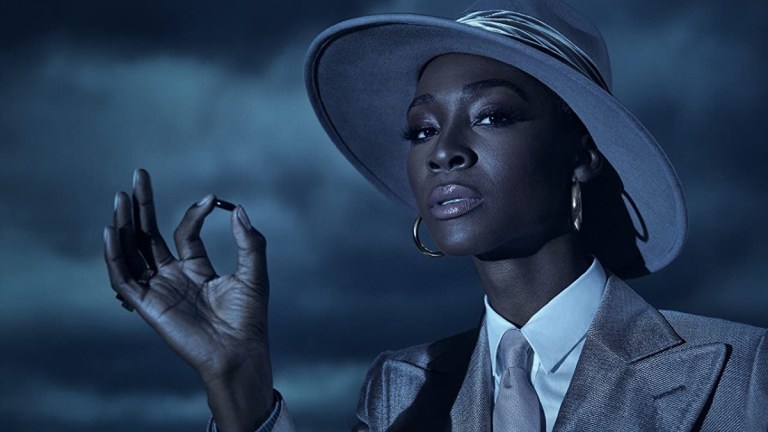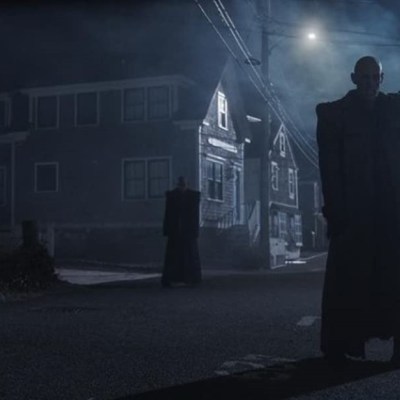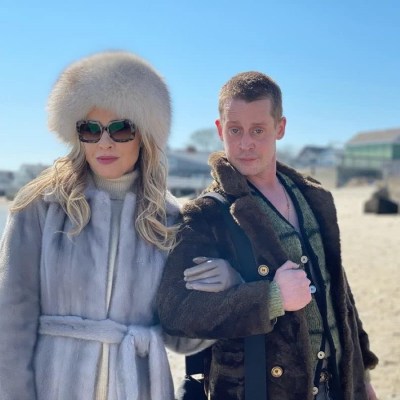American Horror Story: Double Feature Season 10’s Muse Pill Confronts a Stark Truth About Creative Ambition
American Horror Story: Double Feature explains the origins of The Muse and the high price for chasing your dreams.

This American Horror Story: Double Feature review contains spoilers.
American Horror Story Season 10 Episode 4
The Red Tide portion of American Horror Story: Double Feature asks a few simple questions. What would you do if you could suddenly tap into the limitless potential of your talent? What would you trade to be able to live out your dream, be it singing, dancing, writing, or art? For some people, the answer to that would be just about anything, including taking a pill and occasionally turning another human into one of the show’s titular blood buffets. They’re willing to risk any number of side effects to grasp at greatness. They know deep down that they contain that spark of genius, they just need to figure out how to line up the mirrors and turn it into a beacon in the darkness. Even if they actually don’t have any talent, they know in their heart they’re something special.
American Horror Story digs into the terrifying realization that most people who think they can write or create or do something just aren’t that good. We’ve seen what happens to them in Provincetown; they put on long coats, hang out in the graveyard, and look like what Lark refers to as anorexic Uncle Fester or vampire Michael Stipe (both of these things combined are simply one William Patrick Corgan). But what’s interesting is the motivation behind why they become rage-filled, blood-feasting monsters.
It’s not simply the side-effects of the pill, but something deeper. The Kurt Barlows who stalk P-town aren’t full of rage just because they’re hungry, or because The Chemist (Angelica Ross) has made pills that tinker with their brain chemistry in ways they can’t shake off. No, they’re mad because they thought they were special, and it turns out they weren’t. See also every recurring tweet about being a gifted and talented child. To think you’re special and then find out the hard way that like 99 percent of the world you have no extraordinary creative talent is just adding insult to the injury done by The Muse. No wonder everyone becomes a brooding goth monster just looking to cause pain.
It’s on the nose, but when has American Horror Story ever been subtle? If nothing else, the fact that the only real difference between the successful recipients of The Muse and the failed recipients of The Muse is hair and success makes a point about the ability for success to change a person for the worse. Frances Conroy’s Belle Noir might have been an unhappy, milquetoast woman blowing her retirement money on ill-fated book tours, but at least she was a nice person. The first failure we meet, played ably by Spencer Novich, is a vegetarian Buddhist who wants to use his singing to make the world a better place, a la Bono! Even the headliner of the drag show Belle stumbles upon, Crystal Decanter (David Huggard), is successful enough to make a career out of a passion, but is mean-spirited and cutting and forces the other struggling wannabe drag queens to hang out in exchange for makeup tips. Whether you got it or you don’t, The Muse tends to bring out latent rage regardless.
Brad Falchuk’s script goes heavily into the back story of The Muse, and its effects on the person taking it. We’ve seen a lot of them in person, but to hear The Chemist flat-out say why the drug was developed, and how it does its magic, was interesting. It’s a lot of exposition and montage-type stuff, but Angelica Ross is an incredible screen presence even when she’s not really doing anything but wearing cool outfits and doing science things with beakers, and her demeanor helps sell the character as she interacts with her various test subjects, like Belle and the first failed human experiment.
Macaulay Culkin’s Mickey remains one of the show’s more interesting performers. Culkin is great at being both sleazy and wholesome somehow? He’s like if the “hooker with a heart of gold” trope was an actual person with a third dimension, and to watch him tiptoe around his writing dreams is kind of touching, particularly during his interactions with Belle and Sarah Paulson’s TB Karen. In particular, his relationship with Belle is pretty charming, because they both seem to be somewhat shy, despite being involved however loosely in the sex work industry. It’s not terribly surprising they connect fairly easily, and Falchuk makes good use of the easy chemistry between Conroy and Culkin. Frances Conroy goes above and beyond, especially once Belle gets her first taste of amphetamine, and it had to have been an exhausting day of shooting as Belle just dances and dances, both in the forefront of the scene and in the background.
A lot of that attention to detail no doubt is due to the efforts of director Axelle Carolyn, who has become something of a break-out figure in horror circles after, ironically, being a writer and actress. No doubt that experience helped her connect both with her performers—Frances Conroy and Evan Peters are particularly energetic—and the subject matter, specifically just how hard it is when confronted with a blank page and the difficulty of finishing a book. She has a great visual eye, as well, particularly with Belle and Austin’s first feedings. No matter how deep into the weeds of the creative process American Horror Story might get, they never forget why people tune in: gruesome yet satisfying murders.
Carolyn delivers on that front. Sure, the episode is essentially an exposition dump to flesh out the whys and hows of The Muse and the relationship between the denizens of Provincetown and the monsters in their midst, but it’s entertaining stuff buoyed by some great physical performances. There’s a magic to watching people who are great performers do bad things on purpose, and Evan Peters and Frances Conroy in particular make hay with those character beats. The plot is advanced, the stakes are explained further, and everyone has a little bit of fun while the tourists and summer residents are away.


